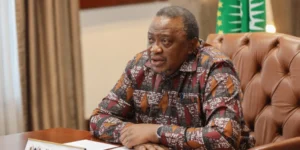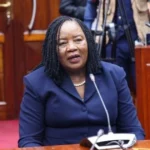The Senate Speaker Amason Kingi has scheduled a special sitting on Wednesday to deliberate on the impeachment motion against Meru Governor Kawira Mwangaza. This comes after members of the Meru County Assembly (MCAs) voted overwhelmingly for her ouster last Thursday, marking the third time she has faced impeachment proceedings.
In a Gazette notice issued on Tuesday, Speaker Kingi announced that the special Senate sitting will commence at 2:30 p.m. at the Senate Chamber, located in the Parliament buildings in Nairobi. The session will be dedicated exclusively to the hearing of the charges against Governor Mwangaza, as stipulated by Senate Standing Order 33 (5). Following the conclusion of this business, the Senate will adjourn until Tuesday, September 3, 2024.
“The business to be transacted at the sitting shall be the hearing of the charges against Ms. Kawira Mwangaza, the Governor of Meru County,” stated Kingi. “In accordance with Standing Order 33 (5) of the Senate Standing Orders, the business specified in this Notice shall be the only business before the Senate during the special sitting.”
The impeachment motion was spearheaded by Zipporah Kinya, the Deputy Majority Leader of the Meru County Assembly. Kinya’s motion accuses Governor Mwangaza of gross violation of the constitution and other laws, gross misconduct, and abuse of office. The motion claims that Mwangaza’s actions have brought “national shame, scandal, embarrassment, ridicule, and disgrace” to Meru County and its leadership.

Governor Mwangaza, a first-time officeholder, has faced several impeachment attempts since her tenure began. In the most recent vote, 49 MCAs supported the motion to remove her from office, while 17 opposed it, and three abstained.
The allegations against Governor Mwangaza include failure to appoint chairpersons for various county boards, such as the Meru County Revenue Board and the Meru Microfinance Corporation, and the illegal revocation of Virginia Miriti’s appointment as county secretary without the required supermajority vote.
Additionally, she is accused of overpaying emergency call allowances to doctors and medical officers, leading to a loss of Ksh. 74.3 million, and using a manual payroll system to pay personnel, resulting in a further Ksh.102.9 million in excessive payments.
Moreover, Mwangaza allegedly employed a “bloated workforce” of at least 111 personal staff members, contributing to a significant increase in the county’s wage bill by over Ksh. 500 million. The impeachment motion also faults her for continuing to pay the full salary and benefits of a staff member who was in remand over a murder case.
Kinya argues that reconciliation efforts with Governor Mwangaza have been unsuccessful, and that her continued leadership has “persistently undermined effective and efficient service delivery” in Meru County, causing significant harm to the interests of its residents.
This is not the first time Governor Mwangaza has faced impeachment. Last November, she survived a second impeachment attempt when the Senate rejected all seven charges brought against her by the Meru County Assembly. The charges included misappropriation of county resources, nepotism, unethical practices, bullying, and usurping statutory powers. She was also accused of contempt of court and the illegal naming of a public road after her husband.
The governor’s first impeachment bid occurred in December 2022, but an 11-member Senate committee found that all charges against her were unproven.
The upcoming Senate hearing will determine whether Governor Mwangaza will be allowed to continue in her role or if the third impeachment attempt will finally lead to her removal from office.













